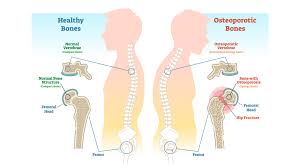Osteoporosis is known as a bone disorder that causes weak bones and increases the chance of fractures simply by bending or performing any normal, non-stressful movements.
Osteoporosis has more than one type:
Type 1 (primary): It is the most common type that is characterized by a rapid loss of calcium in women more than men due to menopause, removal of the ovaries, or lack of estrogen secretion.
The second type (secondary) results from taking some medications and medical drugs, or some other diseases such as thyroid disease, kidney disease, leukemia, digestive system diseases, and others.
There are main factors that cause osteoporosis:
Aging, menopause, estrogen deficiency, three consecutive pregnancies, calcium deficiency and poor absorption as a result of gastrointestinal diseases, an unhealthy diet, lack of exposure to the sun, lack of exercise, taking blood thinners, and taking compounds. Cortisone, liver disease, thyroid disease, kidney failure, excessive thinness and low body mass index, heredity, smoking, and alcohol addiction.
But this does not mean that osteoporosis is a permanent occurrence. Prevention is better than cure. Among the most important nutritional tips that help in preventing osteoporosis are:
Refrain from drinking soft drinks such as cola that contain phosphoric acid, which hinders calcium absorption.
Do not drink large amounts of coffee.
Do not overeat foods rich in protein and fats that increase the excretion of calcium in the urine.
Pay attention not to eat foods rich in calcium with foods that contain iron, as eating them together hinders the absorption of calcium.
Reduce the intake of foods that contain sodium, salt, and preservatives, such as canned foods, pickles, and processed meats, which help expel calcium from the body.
Pay attention to how you walk to avoid falling and do not lift weights.
Proper nutrition is the best way to protect a person from infection
Osteoporosis, so you should eat foods that contain calcium, phosphorus, and vitamin D
Here are some healthy foods rich in these elements:
Milk and dairy products
Sesame leafy vegetables
Egg yolk, fish oil
Mushrooms or salmon
Fortified milk and foods fortified with vitamin D in general.
Adequate exposure to sunlight.
Meat, eggs, oats
For fish and seafood

